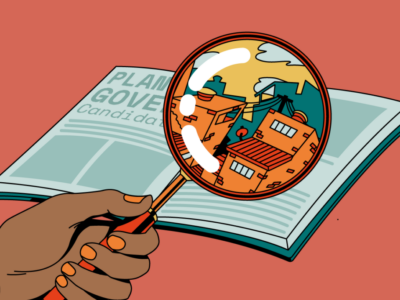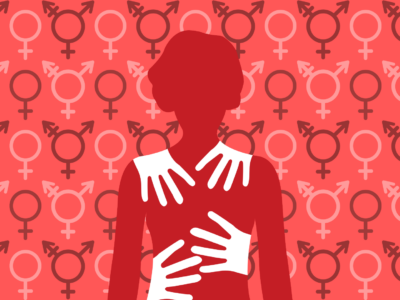
Image courtesy of Giovana Fleck.
In 2022, Brazil faced one of its biggest threats to date: a deeply polarized presidential election with the looming threat of political violence, the spreading of fake news and conspiracy theories, and uncertainty about the future. This threat has come to pass as of January 9, 2023, as Bolsonaro supporters stormed the nation's government buildings, attacked officials and Lula supporters, and launched a series of terrorist attacks against the state.
The terrorists stormed the congress building and Presidential offices to protest what they are falsely claiming is a “rigged election.” Critics are weighing in both domestically and abroad, condemning the violence as an “assault on democracy,” according to Human Rights Watch (HRW).
The 2022 election
For many, this violence is unfortunately unsurprising, given the escalating tensions in Brazil both before and after the election.
Incumbent far-right president Jair Bolsonaro was running for his second term, while former president Luiz Inácio Lula da Silva, a center-left candidate, sought to make a comeback after being released from prison and having the lawsuit against him annulled by a judge.
Lula won in the second round of voting, with a narrow 50.9 percent victory compared to Bolsanor's 49.1 percent. Bolsonaro was slow to concede defeat, waiting until days after the election to acknowledge Lula's victory.
However, even before the election, Bolsonaro had been sowing discontent in the nation — assuring his supporters that there was no way he could lose and that if he did, it was a sign of an unfair election system. After his loss, despite the acknowledgment, he began ramping up these allegations, insinuating the election was rigged and had been stolen from him. indeed.
Bolsonaro's political and military history
Elected in 2018, after over 25 years in the Lower House of Congress, Bolsonaro was born in a town called Eldorado Paulista, in the state of São Paulo, and started his political career after leaving the Army. In the late 1980s, he penned articles protesting the soldiers’ wages and gave an interview talking about a plan to plant bombs in military units in Rio to increase the pressure behind the demands. He was tried, and in the end, the Military Supreme Court claimed it did not have enough evidence to expel him, but the episode gave him enough publicity to be elected as a City Councilor in Rio. During his political career, the now 67-year-old ex-president became known for interviews and speeches defending the military dictatorship, saying that its error was “torturing and not killing” and displaying a cartoon in his cabinet door with a message addressed to the families of the disappeared: “Dogs are the ones looking for bones.”
Bolsonaro began drawing more of the national spotlight after 2010 when he made homophobic and sexist remarks on Brazillian TV shows. In the meantime, three of his sons also entered the political arena.
Nine years ago, Brazilians staged massive protests and riots after the cost of public transport fares skyrocketed. Protestors from across the political spectrum marched to criticize Dilma Rousseff’s government — and their reasons for protesting were just as varied. Brazilians still struggle to understand those months in the streets and often have mixed opinions about the outcome.
Three years later, after winning a second term, Roussef was impeached after being accused of violating fiscal laws. Bolsonaro was among those who voted to impeach her within the Lower House and dedicated his “in favor” vote to a notorious torturer during the military ruling.
Bolsonoro's agenda promised privatization and financial adjustments and loosened gun control legislation — though he was more effective with the latter. In August 2022, Brazil achieved 1 million gun registrations for collectors, shooters, and hunters — that’s more than the total number of arms in Brazil's Armed Forces.
During the COVID-19 pandemic that led to over 684,000 deaths in Brazil, Bolsonaro fought governors, argued against health measures like the use of masks and social distancing, and delayed the purchase of vaccines. He also encouraged people not to get vaccinated and has issued a 100-year secret seal on his own vaccination record.
The president is blaming these COVID-19 prevention measures on the high inflation and the increasing number of people facing hunger in the country. Ahead of the election, he is already voicing doubts about the safety of electronic ballots and the entire electoral process in Brazil.
Lula, on the other hand, uses the memory of people from his social programs that helped to address historical inequalities in the country, such as hunger and racial issues.
Over the last four months, Global Voices and our partners have been covering the election, increasing tensions in the country, and the current political landscape. Find our coverage here:
Stories about Brazil's fight for democracy
Brazil's Congress inquiry names Bolsonaro accountable for attacks to three powers headquarters
The 1.333 page-long report is a product of almost five months of hearings in a mixed investigation commission composed by members of the federal Senate and the Lower Chamber. It was approved with 20 votes in favor and 11 against.
Bolsonaro supporters attempt coup, storming Brazil's three powers headquarters
Jan. 8, 2023, is now a date to remember in Brazil: the day when a bolsonarista mob invaded the nation's top state buildings in an attempted coup, one week after Lula's inauguration.
Bolsonaro kept religious element in public appearances, amidst protests and the end of this term
The 2022 Brazilian presidential campaign was marked by the use of churches and religious leaders as political weapons. As Bolsonaro's government reached its end, the outgoing president seemed to hold on to it.
Lula returns to a divided country in historic comeback as Brazil’s president
The defeated Bolsonaro traveled to the US to avoid passing on the sash and fearing inquiries, while Lula took the presidency in an inauguration marked by symbols and promises of rebuilding.
Violence reached an unprecedented level in Brazil's 2022 election, says survey
In one of the most violent elections in the country's history, Agência Pública's report mapped and verified attacks against voters, candidates, journalists, and workers at research institutes.
Bolsonaro and his supporters continue to undermine democracy after losing Brazil's election
Claiming they want to save Brazil from communism, Bolsonaristas have been protesting while refusing to acknowledge Lula's victory. Meanwhile, Bolsonaro and his party challenged the electoral system at the Electoral Court.
Brazil’s 2022 elections seen from Angola and Mozambique
Despite the distance between them, Brazil remains part of daily debate in Angola and Mozambique.
How football and politics are intertwined in a polarized post-election Brazil
The relationship of many Brazilians with their national team has been one to ponder and continues as Selecao enter the Qatar FIFA World Cup season
City raises Bolsonaro flag amid suffocating smoke from Amazon fires
Novo Progresso, in northern Pará state, is one of the municipalities with the highest number of forest fires and deforestation. It also has strong support for Bolsonaro, reports Amazônia Real.
WhatsApp postpones Brazil launch of new Communities feature until after elections
Initial media reports suggested WhatsApp's decision to withhold the launch was part of an agreement with the Supreme Electoral Court (TSE), with whom Bolsonaro has been at loggerheads due to his groundless remarks about fraud in the electoral system.
Lula elected president for the third time with a split Brazil to govern
Despite Bolsonaro’s attempts to win votes and challenge the voting system, Lula da Silva prevailed for his third term in a deeply split nation.
‘Avengers’ assemble on Twitter to help bring out the vote in Brazil
With a call from Samuel L. Jackson, actors such as Mark Ruffalo and Robert Downey Jr, joined Brazilian influencers to talk about the importance of voting in the presidential runoff
Three violent acts per day during Brazil's first round of elections, according to survey
In a deeply polarised run for the Brazilian presidency, the 2022 campaign has also been marked for attacks and violent episodes offline. Agencia Publica counts the cases registered in the country in the first round of campaign.
Undertones: Brazil copes with ‘digital militias’ ahead of tense elections
Some are asking the courts to not sacrifice what is urgent (stopping the flow of disinformation) for what is important — safeguarding democratic processes.
More guns, fewer control mechanisms: Brazilian journalist analyzes Bolsonaro’s gun policy
"The access to guns was expanded and control mechanisms did not follow the growth pace of guns in the hands of civilians," says Cecilia Olliveira.
Brazilian candidates reduce attention on peripheral neighborhoods in 2022 elections
Peripheral neighbourhoods are largely absent from the speeches and the government plans of candidates to the Brazilian presidency. At least, that is what is indicated by the plans presented to the Electoral Court.
Can citizens of democracies still trust the law? A Global Voices Insights discussion
The flip side of regulating the internet is that this enables the state to mobilise itself and erase the existence of these communities and their identities from popular culture and discussion.
Brazil’s first round of elections: left scores historical wins but bolsonarism still strong
Despite coming in second place by about 6 million votes in the first round, Bolsonaro's allies managed to secure more seats in parliaments and as governors than Lula's candidates, showing his force to mobilize votes.
In Brazil's election year, women in politics denounce recurring threats
In the lead-up to Brazil's 2022 Elections, women in politics have been denouncing threats, which in Brazil is recognized as an electoral crime of political gender violence.
Catholics and evangelicals may get to decide Brazil's next president
Brazil's leading presidential candidates have adopted strategies to attract the support of evangelicals and Catholics.
Under Bolsonaro, political attacks gain institutional legitimacy in Brazil
In February 2022, the Federal Police delivered a partial report to the Supreme Court detailing the structure of “digital militias” coordinating attacks against rival politicians, democratic institutions, and the dissemination of "false news."























